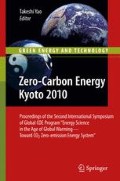Abstract
The realization of a zero-carbon electricity system is of vital importance to a future zero-carbon energy system and society. Nuclear power and renewable energy are expected to contribute significantly to this in the future in Japan. Therefore, in the present study, their roles in future zero-carbon electricity system was examined using long-term scenario analysis from 2005 to 2100 based on an integrated analysis model. The analysis is conducted in three steps to (1) estimate electricity demand and load pattern based on lifestyle and industrial structure in the future using a bottom-up simulation sub-model; (2) plan the optimized power generation mix to satisfied obtained electrical demand and load subject to various constraints including natural resources, economic, environmental, geographic, natural conditions, etc. using an optimization sub-model (3) confirm the reliability of the obtained best mix power generation system by using an hour by hour simulation sub-model. The results give the schedule of nuclear and renewable energy development from 2005 to 2100 and show that they will contribute 60% and 40% respectively in terms of electricity production by 2100. Finally, the whole system is proven as technically feasible with the help of EV (Electric Vehicle) batteries and hydrogen for daily and seasonal electric storage respectively, operated based on smart control technologies.
Access this chapter
Tax calculation will be finalised at checkout
Purchases are for personal use only
References
JAEA (2009) 2100 nuclear vision (in Japanese)
Ministry of Economy (2005) Trade and industry, super long-term strategic technology roadmap, energy technology vision 2100. Ministry of Economy, Japan (in Japanese)
Lund H, Mathiesen BV (2009) Energy system analysis of 100% renewable energy systems – the case of Denmark in years 2030 and 2050. Energy 34:524–531
Jacobson MZ, Delucchi MA (2009) A path to sustainable energy by 2030. Sci Am 301(5):38–45
Uchiyama Y (2008) Global warming and future nuclear power industry. Trans At Energy Soc Jpn 50(4):2–3 (in Japanese)
Zhang Q, Tezuka T, Ishihara KN, Esteban M, Utama NA (2009) Study on a zero-carbon electricity system in Japan using a proposed optimization model. Proceedings of international symposium on sustainable energy and environmental protection (ISSEEP), Yogyakarta, Indonesia, 23–26 November 2009
World Nuclear Association (2009) Nuclear power in France. http://www.world-nuclear.org/info/inf40.html. Updated Oct 2009, Accessed Dec 2009
Tokyo Electric Power Company (2009) Nuclear power monthly capacity factor data. http://www.tepco.co.jp/nu/index-j.html. Accessed Dec 2009 [16]
The Homepage of Kansai Electric Power Cooperation (2009) http://www.kepco.co.jp/localinfo/live/n_unten/teikaku/teikaku.htm. Accessed Dec 2009
Zhang Q (2010) Study on the potential of nuclear power and renewable energy in Japan. GCOE scenario strategy meeting, May 2010 (in Japanese)
Yoda S, Ishihara K (1997) Global energy prospects in the 21st century: a battery-based society. J Power Sources 68(1):3–7
Kariatsumari H, Shimizu N, and Nozawa A(2009) Smart grid ON! – Next generation electricity gird based on battery and sensor, Nikkei Electronics, 2009.10.19:30–52 (in Japanese)
Guille C, Gross G (2009) A conceptual framework for the vehicle-to-grid (V2G) implementation. Energy Policy 37(11):4379–4390
Kempton W, Kubo T (2000) Electric-drive vehicles for peak power in Japan. Energy Policy 28(1):9–18
Hall PJ, Bain EJ (2008) Energy-storage technologies and electricity generation. Energy policy 36(12):4352–4355
Gutierrez-Martın F, Garcıa-De Marı JM, Baıri A, Laraqi N (2009) Management strategies for surplus electricity loads using electrolytic hydrogen. Int J Hydrogen Energy 34:8468–8475
Honma T, Ed. (2006) Handbook of hydrogen and fuel cell, Ohmsha (in Japanese)
Acknowledgements
The authors wish to thank all members in the GCOE scenario planning committee, scenario-advanced technology joint meeting and scenario strategy meeting in Graduate School of Energy Science, Kyoto University for helpful comments and support.
Author information
Authors and Affiliations
Corresponding author
Editor information
Editors and Affiliations
Rights and permissions
Copyright information
© 2011 Springer
About this paper
Cite this paper
Zhang, Q., Mclellan, B., Utama, N.A., Tezuka, T., Ishihara, K.N. (2011). Long-Term Scenario Analysis of a Future Zero-Carbon Electricity Generation System in Japan Based on an Integrated Model. In: Yao, T. (eds) Zero-Carbon Energy Kyoto 2010. Green Energy and Technology. Springer, Tokyo. https://doi.org/10.1007/978-4-431-53910-0_2
Download citation
DOI: https://doi.org/10.1007/978-4-431-53910-0_2
Publisher Name: Springer, Tokyo
Print ISBN: 978-4-431-53909-4
Online ISBN: 978-4-431-53910-0
eBook Packages: EngineeringEngineering (R0)

